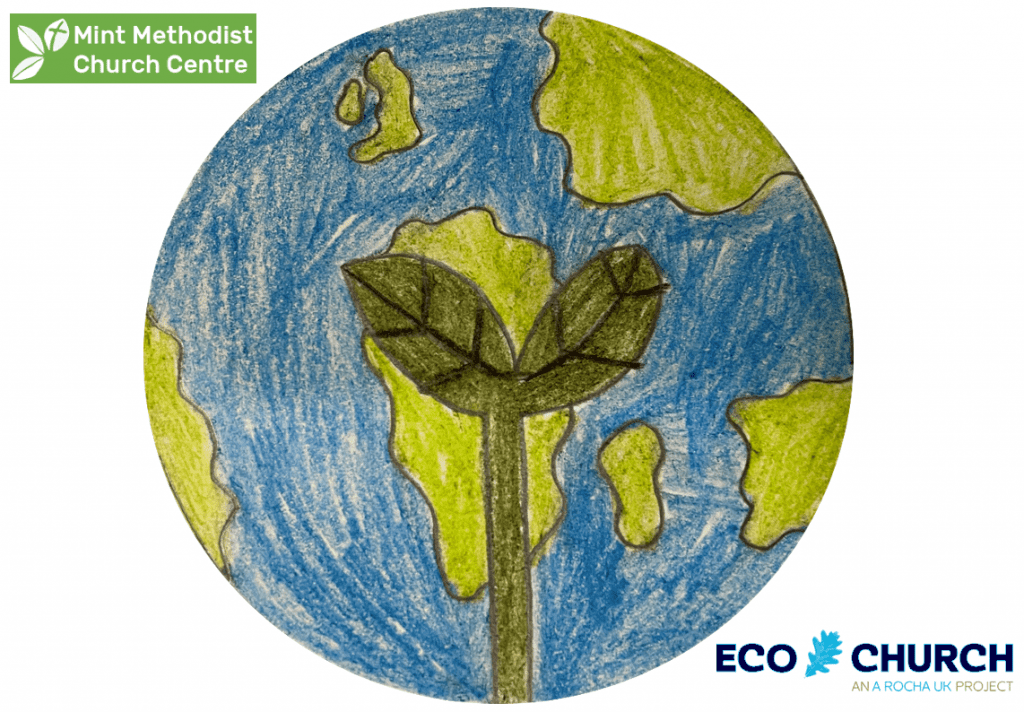
Carbon Footprint – Travel survey
As part of the Eco Church initiative, we are starting to measure the Mint’s carbon footprint. This is the amount of carbon the church emits through heating, travel, and other activities. We want this to decline towards zero over time as we seek to care for and sustain God’s creation for the future.
Part of our carbon footprint is how we travel to church – do we come by car, on foot, or by bus – and how far is it? To find out, we are planning a short survey. After the services on 12, 19 and 26 June we will be asking members of the congregation to answer just two short questions. We aim to get as many responses as we can, so please be ready to answer! Thanks. Martin Easton.
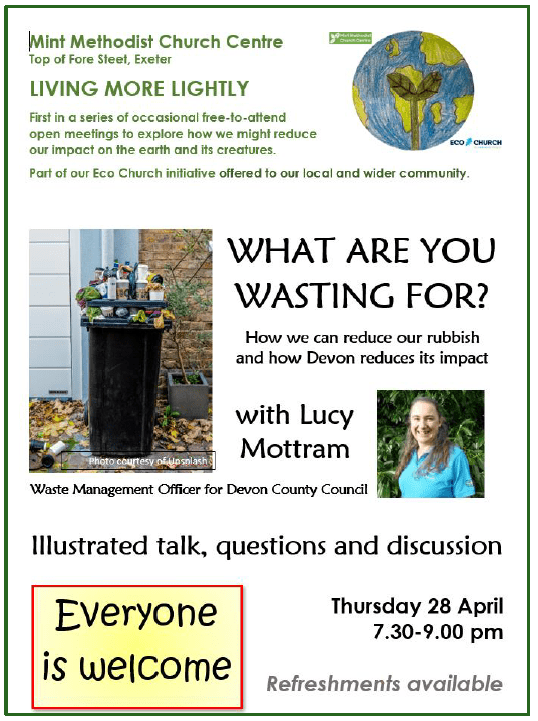
Living more lightly
In April we host the first in a series of speaker meetings looking at ways in which as individuals, church, and society we can lighten our impact on the earth. We hope that publicising these meetings will draw in others from the communities of which we are a part, and strengthen partnerships between The Mint as an Eco Church and other groups and organisations working for the sustainability of human tenancy of planet earth. Meetings will therefore be aimed at people in general, so please encourage friends, neighbours and colleagues to attend. The April meeting will be at The Mint (poster opposite).
Making Eco-Friendly Choices
With Spring in the air, Stephen Mosedale shares some ideas on responsible stewardship of your garden or outdoor space. Land is a precious resource, especially in built-up areas. Those of us with larger gardens have a greater responsibility to manage them sustainably, but the smallest space can make a positive ecological contribution whilst at the same time encouraging us to enjoy being outside which enhances our own wellbeing. So please
take from what follows the things that can fit with the space you have. When re-designing or adding new features to a garden avoid things like concrete patios which feed rain water into the drainage system depleting the local water table and dumping it elsewhere where there is already likely too much! Bricks or stone with gaps to allow soakaway are the best hard materials, or create a wooden deck (perhaps with reclaimed timber) over loose soil or ballast.
Modest lawns are attractive for sitting or children’s play provided you don’t waste water on them, but accept that our changing climate will lead them to brown in long droughts and renew themselves automatically when rain follows. But woodland rather than grass is the natural vegetation of this zone of the world so, if there are areas you do not intend to cultivate, plant small native trees rather than endless grass and spend all the mowing time you save on some of the suggestions below!
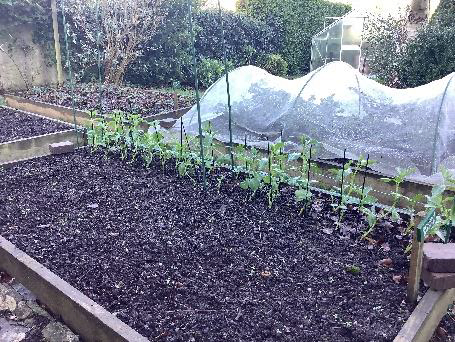
For those with even limited space, growing vegetables and fruit is clearly a responsible and enjoyable activity, and even those with no more outside space than a balcony can grow fresh herbs in pots. Raised beds have many advantages, and no-dig methods in which compost or other organic (but non-peat based) material is spread on the beds each autumn or early spring invariably produce higher yields than digging in that compost which destroys the soil structure and the fungi that serve to aerate it and distribute the nutrients. If you are one of the rare sort who really enjoy digging you can always go to the beach and build an impressive sandcastle!
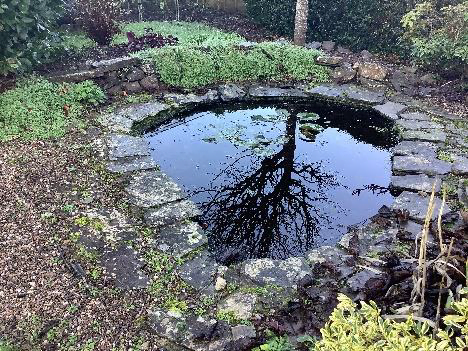
You need not be a passionate organic gardener to commit as far as possible to avoiding chemical pesticides and weedkillers which invariably have a negative long- term impact. Like artificial breaking up of the soil by digging these destroy the natural balance of life so that dealing with one problem tends to lead to another. Ladybirds for example which naturally control aphids are very susceptible to pesticides. If greenfly, blackfly or whitefly are a problem then planting a few French marigolds among the crop will keep them away. Slugs and snails are best controlled by keeping areas near crops clear of waste vegetation, and by going out with a torch after dark and removing them. If you must use slug pellets use organic ones which are harmless to birds. Control weeds by using suitable groundcover plants wherever possible and with hand weeding.
A healthy balance of wildlife in a garden is aided by including a pond and/or a wild flower area. Choosing an appropriate packet of mixed wild flower seeds
suited to your soil will attract pollinators. If you choose to grow other flowers in your garden it makes sense to choose native varieties rather than exotic ones; they will need less water and will attract native butterflies and bees.
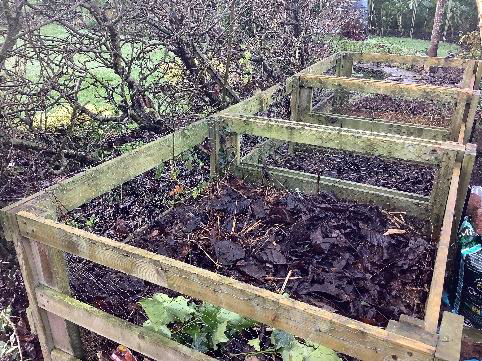
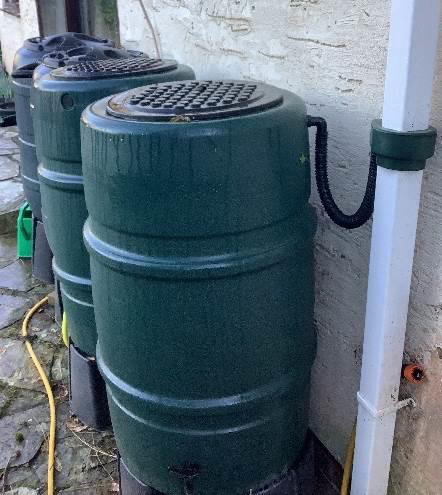
Do make your own compost, whether with open heaps or in containers. As well as garden and food waste, torn cardboard packaging and scrunched waste paper helps speed decomposition and the production of good quality compost for the garden. None of those materials goes into kerbside or offsite recycling in our home. If there are trees on or adjacent to your property make leaf mould with them to mix with compost, or add them to the compost heap. Avoid thick layers of leaves or lawn mowings but mix ingredients together. The other local resource we should use is rainwater: water butts are easily installed where there are plastic downpipes, and there are other in house uses that the water can be put to if you do not need all that you gather for watering.
There hasn’t been space in this article to go into detail about the suggestions but please talk to me about anything that interests you.
